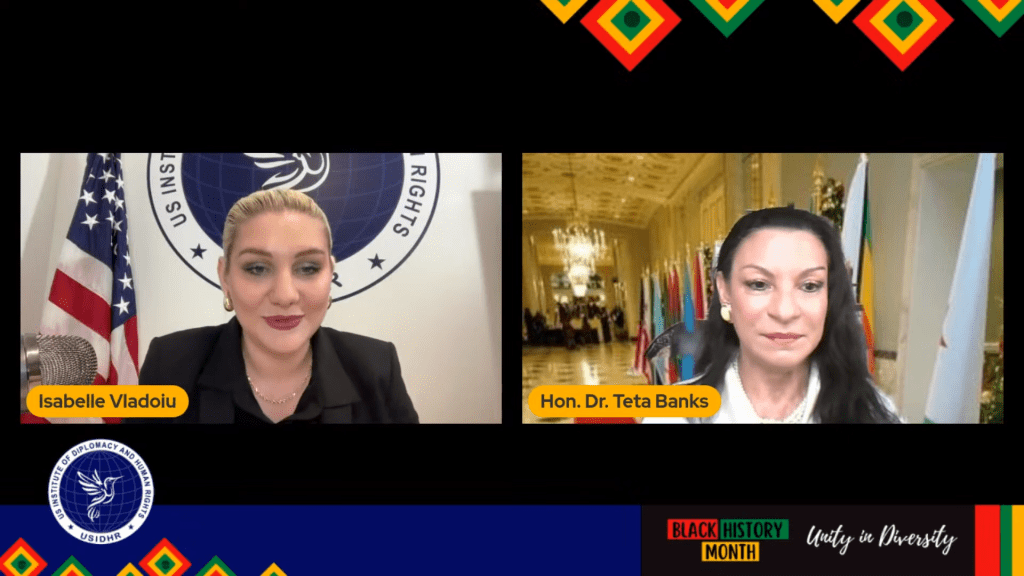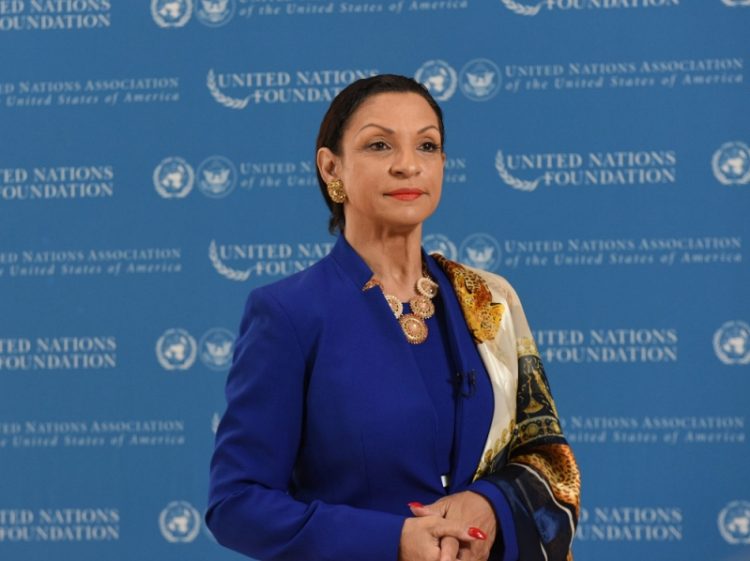In a webinar hosted by the US Institute for Diplomatic and Human Rights (USIDHR) to commemorate Black History Month, the Honorable Dr. Teta V. Banks brought her wealth of wisdom, experience, and unyielding dedication to global human rights to the virtual stage.
Dr. Teta Banks’s life story is deeply intertwined with a legacy of civil rights activism that spans continents. Born in Liberia and raised in Detroit, Michigan, she was nurtured in a family deeply committed to civil rights, counting among their friends and colleagues iconic figures like Dr. Martin Luther King Jr. and Mrs. Rosa Parks. This upbringing instilled in her a profound sense of duty and passion for advancing the rights of marginalized communities, both domestically and internationally.
During the webinar, Dr. Banks shared profound insights into the evolution of human rights activism, drawing parallels between civil rights movements in the United States and global human rights struggles. She emphasized the importance of not only understanding human rights principles but also implementing strategies to address violations and empower marginalized communities globally.
Dr. Banks’s influence extends far beyond national borders. She highlighted ongoing initiatives to support countries grappling with human rights challenges, such as Rwanda, Congo, Ethiopia, and Haiti. Through partnerships with organizations like the World Federation of United Nations Associations and grassroots civil society groups, she works tirelessly to promote peacebuilding, women’s rights, and educational opportunities in conflict-affected regions, exemplifying her commitment to global solidarity and justice.
One of Dr. Banks’s key messages revolved around the revolutionary power of education and community engagement in advancing human rights. She stressed the need to instill values of education, excellence, and social responsibility in young minds, paving the way for a generation of global citizens devoted to justice and equality. Her emphasis on proactive engagement and grassroots initiatives underlines the pivotal role individuals play in effecting meaningful change in their communities and beyond.

As the webinar concluded, Dr. Banks issued a passionate call to action, urging individuals to seize opportunities for advocacy, education, and collaboration. She emphasized that the power to effect change lies within each person, whether through grassroots activism, partnerships with organizations, or raising awareness in local communities as she quoted Dr. Martin Luther King Jnr. : “One of the greatest tragedies is for doors of opportunity to open and for people not to be prepared to walk into them.”
She emphatically stated: “So, wherever there are opportunities, encourage people to take advantage of those opportunities. The opportunities aren’t just going to come to you. Sometimes many of our groups think, “Well, they’re gonna have an attitude towards me,” or “I’m not going to fit in,” or “I may be the only one.” That’s okay. You have an individual responsibility to take advantage and look for those access opportunities. And then we also have the professional responsibility to ensure that those access opportunities are available, are developed first, and that they are available.”
Throughout her illustrious career, Dr. Banks has held numerous leadership positions that reflect her resolute commitment to social justice and equality. Currently serving as the Chair of the World Federation of United Nations Associations, she advocates tirelessly for global human rights on an international platform. Her appointment as Executive Director of the King Association for Nonviolence, by none other than Coretta Scott King herself, accentuates her dedication to carrying on the legacies of civil rights icons.
Additionally, her role as President of the National Coalition of 100 Black Women and her consultancy with the Frederick Douglass Family Foundation further solidify her status as a trailblazer in the fight for equality and justice, particularly for marginalized communities.









